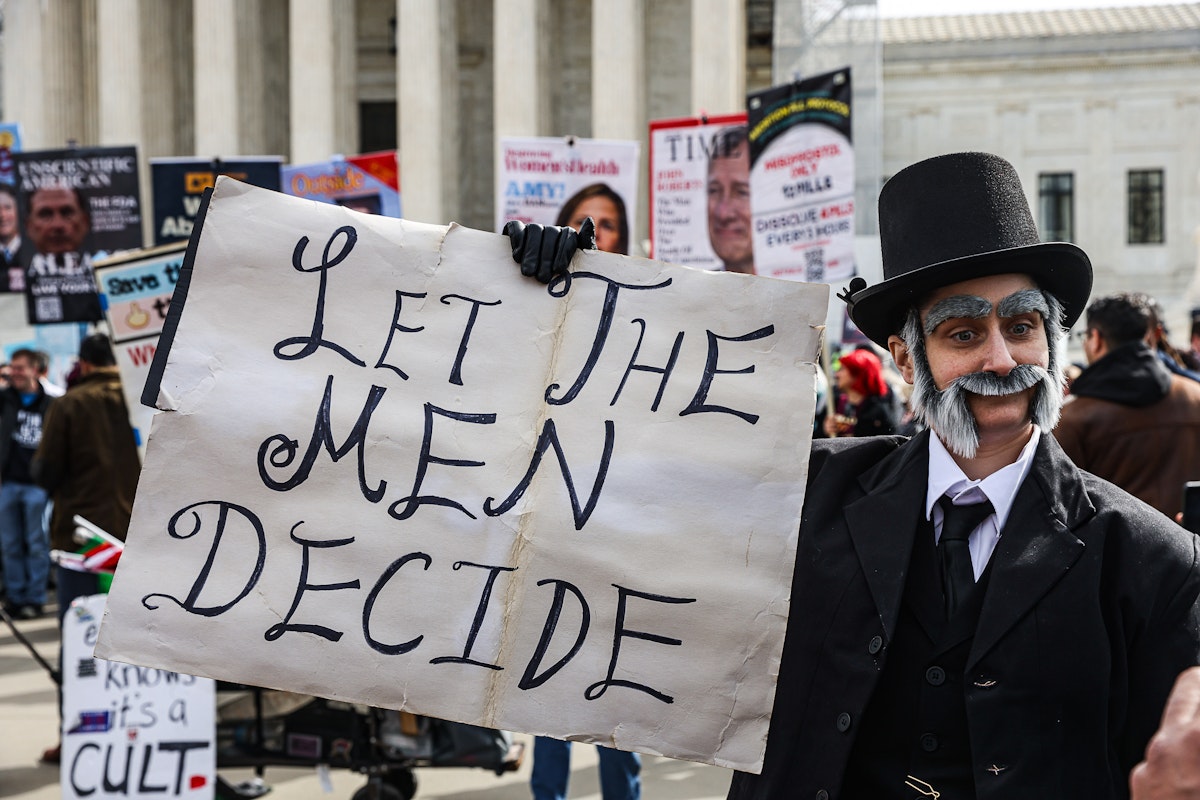Republicans Are Running Scared From Their Own Abortion Positions
About a half-hour before the Supreme Court heard oral arguments last month in Food and Drug Administration v. Alliance for Hippocratic Medicine, the case that’s become the Christian right’s next big bet on ending abortion in the United States, a cluster of anti-abortion activists gathered on the court’s steps to call for the prosecution of people who have obtained mifepristone—a drug used in more than 60 percent of abortions in this country—through the mail. Several men in the group held signs specifically urging the enforcement of the Comstock Act, a 151-year-old anti-obscenity law that was used at the turn of the twentieth century to arrest people for sharing information and items used for abortion and contraception, such as mailing educational pamphlets or medical supplies. One sign quoted Matthew Kacsmaryk, the federal judge in Texas who originally heard the mifepristone challenge: “The Comstock Act plainly forecloses mail-order abortion.” While that law remains on the books, and some of its scope was narrowed substantially over the past century by court rulings and Congress, the Comstock Act was presumed to be a dead letter with 1973’s Roe v. Wade decision. Some of those provisions remain, including those that could be used to target abortion. So why, I asked the group, enforce it now? “The Comstock Act was about, uh, remember Margaret Sanger?” one of them said. Sanger, a founder of Planned Parenthood, in 1916 had her birth control clinics raided and was criminally charged under New York state’s version of the law. Did they think it’s OK to arrest people like that, and to jail people for sending the abortion pill? They wouldn’t answer me. These men’s position—and reticence when challenged about it—is not unusual any more among anti-abortion activists. In a matter of months, the notion that the Comstock Act should be revived is now finding support among not just activists but lawmakers, and they’re just as unwilling to acknowledge what enforcement of the law would mean: arresting people for having or helping people have abortions. In March, 145 Republican members of Congress signed onto an amicus brief in FDA v. Alliance for Hippocratic Medicine supporting this use of the Comstock Act to prohibit the mailing of mifepristone. Their brief alleges that the Comstock Act is still enforceable and that the FDA was “blatantly disregarding the federal law’s prohibition on the mailing and interstate shipment of abortion-inducing drugs.” Like the anti-abortion activists outside the court, I asked a sample of the higher-profile members of Congress who signed the brief for more specifics about how they believe the Comstock Act could and should be enforced. Senators Katie Britt, Marsha Blackburn, Ted Cruz, and Josh Hawley were each asked whether they support using the Comstock Act “to prosecute those who obtain mifepristone through the mail—including those who use the pill for the purpose of self-managing their own abortion.” Representatives Robert Aderholt, Lauren Boebert, Jim Jordan, and Elise Stefanik were asked the same question. None responded.The purpose of these members’ brief was to support the Alliance for Hippocratic Medicine, or AHM, the anti-abortion group that brought the mifepristone challenge. They are represented by a Christian-right group called Alliance Defending Freedom, or ADF, a veteran of anti-abortion litigation at the Supreme Court, including the Dobbs case, which overturned Roe v. Wade in 2022. Far from signaling that anti-abortion groups were done, Dobbs set the stage for the mifepristone case. In fact, AHM was legally incorporated not long after Dobbs, and as The New Republic has reported, the group appears to exist largely to overturn the FDA’s approval of mifepristone. There are several named plaintiffs in the case, such as Indiana state Senator Tyler Johnson, an anti-abortion activist who has worked with ADF to pass anti-trans legislation in his state. AHM’s legal challenge pushes anti-abortion pseudoscience to argue that the FDA carelessly approved mifepristone. They further allege that the FDA approved a means of dispensing the drug that violates federal law—by permitting mifepristone to be prescribed via telehealth.This second claim is what the amicus brief from 145 members of Congress takes up, supporting the notion that the FDA approved mifepristone in defiance of the Comstock Act’s prohibitions. Congress has “decreed,” their brief states, “that abortion-inducing drugs are ‘nonmailable matter’ and prohibited their shipment by the United States Postal Service and common carriers, protecting women and girls from the heightened risks of mail-order chemical abortion drugs.” For this, they cite two provisions of the Comstock Act barring the mailing, transportation, or importation of “obscene matter,” which the Act defines expansively and broadly. Such “matter” includes: “every article, instrument, substance, drug, medicine, or thing which is advertised or described in a manner calculated

About a half-hour before the Supreme Court heard oral arguments last month in Food and Drug Administration v. Alliance for Hippocratic Medicine, the case that’s become the Christian right’s next big bet on ending abortion in the United States, a cluster of anti-abortion activists gathered on the court’s steps to call for the prosecution of people who have obtained mifepristone—a drug used in more than 60 percent of abortions in this country—through the mail. Several men in the group held signs specifically urging the enforcement of the Comstock Act, a 151-year-old anti-obscenity law that was used at the turn of the twentieth century to arrest people for sharing information and items used for abortion and contraception, such as mailing educational pamphlets or medical supplies. One sign quoted Matthew Kacsmaryk, the federal judge in Texas who originally heard the mifepristone challenge: “The Comstock Act plainly forecloses mail-order abortion.”
While that law remains on the books, and some of its scope was narrowed substantially over the past century by court rulings and Congress, the Comstock Act was presumed to be a dead letter with 1973’s Roe v. Wade decision. Some of those provisions remain, including those that could be used to target abortion. So why, I asked the group, enforce it now? “The Comstock Act was about, uh, remember Margaret Sanger?” one of them said. Sanger, a founder of Planned Parenthood, in 1916 had her birth control clinics raided and was criminally charged under New York state’s version of the law. Did they think it’s OK to arrest people like that, and to jail people for sending the abortion pill? They wouldn’t answer me.
These men’s position—and reticence when challenged about it—is not unusual any more among anti-abortion activists. In a matter of months, the notion that the Comstock Act should be revived is now finding support among not just activists but lawmakers, and they’re just as unwilling to acknowledge what enforcement of the law would mean: arresting people for having or helping people have abortions.
In March, 145 Republican members of Congress signed onto an amicus brief in FDA v. Alliance for Hippocratic Medicine supporting this use of the Comstock Act to prohibit the mailing of mifepristone. Their brief alleges that the Comstock Act is still enforceable and that the FDA was “blatantly disregarding the federal law’s prohibition on the mailing and interstate shipment of abortion-inducing drugs.” Like the anti-abortion activists outside the court, I asked a sample of the higher-profile members of Congress who signed the brief for more specifics about how they believe the Comstock Act could and should be enforced. Senators Katie Britt, Marsha Blackburn, Ted Cruz, and Josh Hawley were each asked whether they support using the Comstock Act “to prosecute those who obtain mifepristone through the mail—including those who use the pill for the purpose of self-managing their own abortion.” Representatives Robert Aderholt, Lauren Boebert, Jim Jordan, and Elise Stefanik were asked the same question. None responded.
The purpose of these members’ brief was to support the Alliance for Hippocratic Medicine, or AHM, the anti-abortion group that brought the mifepristone challenge. They are represented by a Christian-right group called Alliance Defending Freedom, or ADF, a veteran of anti-abortion litigation at the Supreme Court, including the Dobbs case, which overturned Roe v. Wade in 2022. Far from signaling that anti-abortion groups were done, Dobbs set the stage for the mifepristone case. In fact, AHM was legally incorporated not long after Dobbs, and as The New Republic has reported, the group appears to exist largely to overturn the FDA’s approval of mifepristone. There are several named plaintiffs in the case, such as Indiana state Senator Tyler Johnson, an anti-abortion activist who has worked with ADF to pass anti-trans legislation in his state. AHM’s legal challenge pushes anti-abortion pseudoscience to argue that the FDA carelessly approved mifepristone. They further allege that the FDA approved a means of dispensing the drug that violates federal law—by permitting mifepristone to be prescribed via telehealth.
This second claim is what the amicus brief from 145 members of Congress takes up, supporting the notion that the FDA approved mifepristone in defiance of the Comstock Act’s prohibitions. Congress has “decreed,” their brief states, “that abortion-inducing drugs are ‘nonmailable matter’ and prohibited their shipment by the United States Postal Service and common carriers, protecting women and girls from the heightened risks of mail-order chemical abortion drugs.” For this, they cite two provisions of the Comstock Act barring the mailing, transportation, or importation of “obscene matter,” which the Act defines expansively and broadly. Such “matter” includes: “every article, instrument, substance, drug, medicine, or thing which is advertised or described in a manner calculated to lead another to use or apply it for producing abortion, or for any indecent or immoral purpose.” This could potentially apply to everyone involved in medication abortion: the drug manufacturer (something Supreme Court Justice Clarence Thomas seemed to support at oral argument), the distributors, the health care providers, and the people who use the drug. If federal prosecutors brought cases under the provisions these members of Congress say should be enforced, sending or receiving mifepristone through the mail could potentially result in five years in prison.
This brief is not an isolated argument. These members of Congress who are arguing that the Comstock Act already prohibits mailing mifepristone are also advancing a larger plan openly advocated by the Christian right: to get a friendly attorney general to enforce Comstock as a national abortion ban. While their chosen candidate is getting scrutinized for whether he would sign a federal abortion ban, groups like the Heritage Foundation, along with Alliance Defending Freedom and more than 100 allied groups, are already rallying support for using the Comstock Act to immediately put into motion what they likely couldn’t win in Congress. As one anti-abortion attorney told The Atlantic recently, “Federal bans can’t pass,” but they don’t need to with Comstock already on the books. Among the ideas he floated for enforcing the Comstock Act? As the reporter paraphrased them, “The administration could kick Planned Parenthood out of Medicaid by saying that the women’s health care provider violates the act, he suggested. It could launch criminal investigations into abortion funds and abortion-pill distribution networks.”
This Republican-backed campaign to revive the Comstock Act as a national abortion ban is happening right in the open, but Democrats have not sufficiently acknowledged this threat. After Dobbs, the Department of Justice did issue legal guidance on abortion medications and the Comstock Act, stating that the law did not necessarily prohibit the mailing of the drugs. This week, a Biden campaign manager sent a memo to the press, noting that Trump’s advisers intend to use Comstock as a national abortion ban. That’s about it. There’s little open resistance from Democrats in Congress, with the notable exception of Representative Cori Bush, who called for repealing Comstock in March. The Washington Post editorial board voiced its support for a repeal as well. “Democrats should lead that effort while they still control the Senate and the White House,” they wrote earlier this month. “Let House Republicans refuse to consider a bill, or the Senate GOP filibuster one, and explain to voters why they oppose eliminating even the theoretical chance people could get up to five years in prison (the maximum penalty for a first offense) for shipping mifepristone.”
We know where at least 145 Republican members of Congress stand on that question. Momentum is, so far, with them. They don’t have to do anything but get someone in the White House who’s willing to enforce their new favorite old law.



